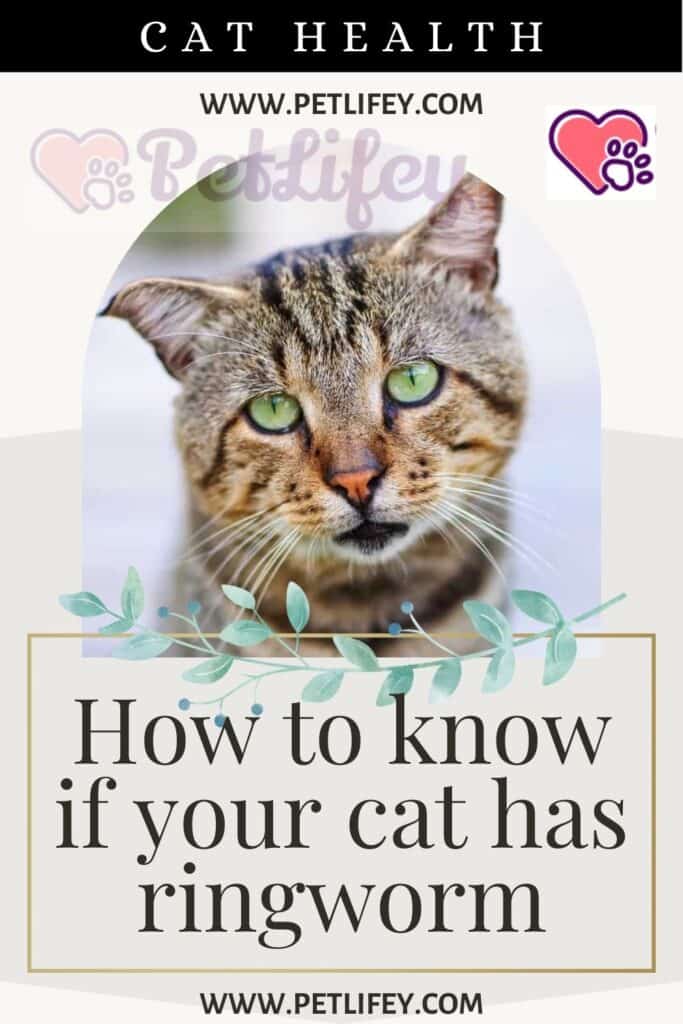
The Ringworm is a highly contagious disease, also for humans. It is essential to detect it as soon as possible, to eliminate the fungus. At Petlifey, we explain how to know if a cat has ringworm, the most common symptoms and what treatment to apply.
What is ringworm in cats

Ringworm is a dermatological condition that is caused by the spread of fungi. Not only cats get ringworm, people and dogs can also be affected by it.
That is why it is essential that you know how to diagnose ringworm. In addition to all this, it is important that you know that it is a very contagious disease and can easily pass from people to animals and vice versa.
You should know that this fungus feeds on the keratin in the body, especially on the nails, skin and coat. For this reason it is very common to see that these areas are damaged, since they do not have hair and there is a large presence of this fungus.
As soon as you notice any anomaly of this kind, you have to go to the vet so that it ends its reproduction and thus achieve that your cat recovers as soon as possible.
Symptoms of ringworm in cats
If you want to know if a cat has ringworm, you will have to look at the various symptoms that this ailment causes on your feline’s body. As we have said before, the most affected areas are the nails and hair, but there are also other signs and manifestations that will let you know if your feline pet is suffering from this disease:
- Appearance of bald spots: Usually, this disease causes your pet’s coat to fall, it is for this reason that your cat may have significant bald spots (areas where the hair has fallen).
- Scabs: if you detect flaking or scabs in certain areas of your cat’s body, it may be that they are produced by this fungus.
- Broken nails: If you see that your pet’s nails break more easily or are more fragile, it may be because the fungus is implanted in this place.
- It scratches a lot: If you notice that lately your kitten scratches a lot more than usual, it may be that he has some skin ailment and this could be ringworm. But there are other signs of this disease, not just scratching, if you also detect that your kitten licks or chews much more than normal, it may be that it is suffering from this condition.
- Different smell: This condition also makes the smell that your cat gives off is not the same as always, since the fungus produces changes in the smell of its body.
Apart from what we have said before, it is essential that you know that the parts of your pet’s body that are affected first of all are the ears and limbs.
If you see any of the signs of this disease in your kitten, it is advisable that you quickly go to the vet for a treatment in order to heal your kitten.
Treatment of feline ringworm
The reproduction of ringworm is very fast and in a very few days it may be that the signal that you had detected, for example, in your cat’s ears, spreads throughout its body.
It is essential that you treat it immediately in order to control this disease and so that you have your family and your environment well protected.
If you detect that your feline is affected by ringworm, the first thing you have to do is go to the vet for an examination and see if it really has this ailment or if, on the contrary, it has a more serious disease that produces this modification in your pet’s skin, such as cat leukemia.
The vet will prescribe the best treatment for ringworm, in this way your kitten will get rid of this infectious fungus.
Most likely, you will be given a cream, ointment, or powder treatment. It is true that there are medicines that are prescribed orally, but it is recommended that it be only for severe cases, since they are very aggressive and can affect the health of your pet.
In any case, before giving the treatment prescribed by the specialist, we advise you to carry out a hygiene with iodine or an antiseptic. In order to disinfect the skin of your furry friend. Once it is clean, you can put the product that has been prescribed for you.
You should repeat the procedure according to the dose prescribed by your vet. And above all, you have to be patient, since it is a long treatment that can last up to 3 months .






